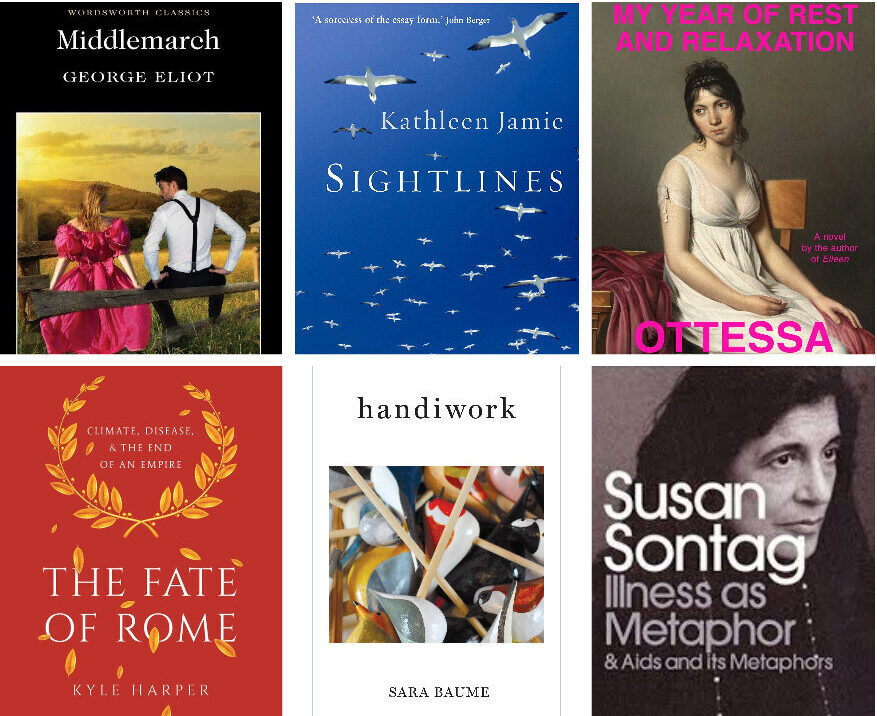
We’re another week into a national lockdown, meaning it’s time for another series of book recommendations from those most qualified to give them – Trinity’s English lecturers.
We’re also just days away from an exam season the like of which we’ve never seen before, so in times of stress it’s worth reaching for the shelf and grabbing a book to whisk you away from the realities of a terrifying pandemic and a daunting set of exams.
Dr Jarlath Killeen
Although it is not a book that addresses directly the precise challenges we are currently trying to meet, I would recommend George Eliot’s Middlemarch (1871–72) to those looking for something that will provide careful reflection on periods involving profound cultural transformation. Virginia Woolf called it “one of the few English novels written for grown-up people”, and while I think that is a bit sweeping, what is striking about the novel is the extraordinary generosity of Eliot’s mature understanding of the sheer complexity of human beings – even (especially?) those to whom we are least inclined to extend our sympathies.
One of the main characters, Dorothea Brooke, echoing the opinion of her creator, explains that “I believe that people are almost always better than their neighbours think they are”. The novel goes on to demonstrate, vividly, how dangerous and damaging any incapacity for sympathy and understanding is, particularly in moments of personal and political stress. It helps, as well, that this is the greatest novel in English ever written, by the greatest novelist who ever lived (other opinions are available). It is also, famously, one of the “great” novels that many people say they intend to read at some stage.
Dr Björn Quiring
I have started to read Kyle Harper’s The Fate of Rome, an environmental history of late antiquity. It makes the case that the fall of the Roman Empire was not caused by decadence and barbarian invaders, but by pandemics and climate change. Maybe there’s a lesson to be learned here? In any case, the book allows you to see the epoch in a new light, and it’s very well written. Furthermore, you can actually download it for free, from JSTOR, using your Trinity library account.
Dr Alice Jorgensen
As we explore and re-explore our islands of 2km radius, it’s a time for writers who teach us how to see. In her essay collections Findings (2005) and Sightlines (2012), Kathleen Jamie writes about everything from the birds in her garden to whale skeletons in a Bergen museum with utter clarity and a kind of cool, deep love. It’s an escapist choice if you like – no trips to Norway for us right now – but an escape into the real. I’ve just ordered myself her latest book, Surfacing (2019), as a lockdown treat.
Dr Kevin Power
I’m going to recommend two pandemic-appropriate books. The first is Susan Sontag’s Illness as Metaphor (1978), the point of which is that illness is not a metaphor – worth remembering, while everyone talks about “war” and “frontline troops” and all the rest of it. The other is My Year of Rest and Relaxation (2018) by Ottessa Moshfegh, about a grief-stricken young woman who tries to use a new drug, Infermiterol, to sleep through a year of her life. I get the feeling that we could all use some infermiterol, right around now.
Dr Jane Carroll
“From troubles of the world / I turn to ducks.” Or rather, I turn to birds of all kinds. While we’re all confined to our houses, the birds are busy building new ones and you can spot them gathering up scraps of feathers and grass to line their little homes or squabbling over territory.
My favourite to watch are wrens. Their Latin name is Troglodytes troglodytes, meaning “cave-dweller, cave-dweller”, because they nest in the strangest places. But they are fussy in their own way. The male makes several nests and sings outside each of them in turn, warning off competitors and trying to woo a mate. If she seems interested, she’ll inspect each of his nests and choose her favourite.
The book that accompanies my back-garden birding is Sara Baume’s handiwork. It is a book about making and about making routines, and about grief, and new beginnings. And it is haunted all the way through by birds. Baume writes with wry humour about trying to attract birds to her garden and realising that they are wild things that will come and go exactly as they please. As the birds build their nests, Baume builds her own home, shaping a life around her craft and her body and her memory.
I recommend reading Baume’s tight, lyrical prose and listening to birdsong in between pages. It will make everything feel better for a little while.
Reporting by Martha Kirwan.






